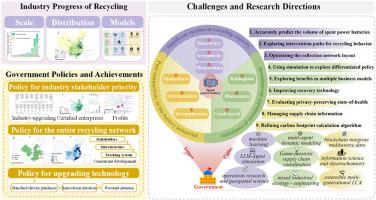中国废旧动力电池管理:进展、政策与挑战
IF 16.3
1区 工程技术
Q1 ENERGY & FUELS
引用次数: 0
摘要
废旧动力电池的快速积累对全球资源循环和环境可持续性提出了严峻挑战。作为世界上最大的电动汽车(EV)市场,中国的电池回收行业受到了学术界的广泛关注。然而,现有研究忽视了中小回收企业的动态、政策工具的时间演化模式和跨学科整合机制。为了解决这些差距,本研究综合了2012年至2023年的零散工业数据,包括54,000多家注册回收商,50项国家政策和30项技术标准。此外,我们提出了一个五阶段的政策演变框架,通过七个维度比较五个国家的政策。其一,回收产业产能和网络覆盖广泛,但存在“低资本集聚”现象,98%的企业注册资本在700万美元以下。其次,政策框架优先考虑基于激励的机制而不是执行机制,并经历了三个不同的阶段:试点(2012-2015年)、制度化(2016-2019年)和产业结构调整(2020-2024年)。对新兴经济体的关键影响包括:通过立法澄清利益相关者的责任,优先考虑劳动密集型拆卸技术,以及采用白名单认证制度以规范市场参与。第三,结构性产能过剩、经济环境权衡、供应链碎片化等问题仍未解决。最后,本研究提出九个研究方向,整合计算机科学、化学、人类学、空间科学、环境工程和其他十多个学科的方法来解决这些问题。本文章由计算机程序翻译,如有差异,请以英文原文为准。

Management of spent power batteries in China: Progress, policies, and challenges
The rapid accumulation of spent power batteries presents critical challenges to global resource circularity and environmental sustainability. As the world's largest electric vehicle (EV) market, China has seen its battery recycling sector garner significant academic attention. However, existing studies have neglected the dynamics of small and medium-sized recyclers, temporal evolution patterns of policy instruments, and cross-disciplinary integration mechanisms. To address these gaps, this study synthesizes fragmented industrial data from 2012 to 2023, encompassing over 54,000 registered recyclers, 50 national policies, and 30 technical standards. Additionally, we propose a five-stage policy evolution framework to compare policy across five nations through seven dimensions. Firstly, the recycling industry shows extensive capacity and network coverage, yet exhibits "low-capital agglomeration", with 98 % of enterprises operating below $7 million in registered capital. Secondly, policy frameworks prioritize incentive-based mechanisms over enforcement and have transitioned through three distinct phases: pilot programs (2012–2015), systematization (2016–2019), and industrial restructuring (2020–2024). Key implications for emerging economies include legislative clarification of stakeholder responsibilities, prioritization of labor-intensive disassembly technologies, and adoption of a whitelist certification system to standardize market participation. Thirdly, persistent challenges including structural overcapacity, economic-environmental trade-offs, and supply chain fragmentation remain unresolved. Finally, this study proposes nine research directions that integrate methodologies from computer science, chemistry, anthropology, space science, environmental engineering, and more than 10 other disciplines to address these issues.
求助全文
通过发布文献求助,成功后即可免费获取论文全文。
去求助
来源期刊

Renewable and Sustainable Energy Reviews
工程技术-能源与燃料
CiteScore
31.20
自引率
5.70%
发文量
1055
审稿时长
62 days
期刊介绍:
The mission of Renewable and Sustainable Energy Reviews is to disseminate the most compelling and pertinent critical insights in renewable and sustainable energy, fostering collaboration among the research community, private sector, and policy and decision makers. The journal aims to exchange challenges, solutions, innovative concepts, and technologies, contributing to sustainable development, the transition to a low-carbon future, and the attainment of emissions targets outlined by the United Nations Framework Convention on Climate Change.
Renewable and Sustainable Energy Reviews publishes a diverse range of content, including review papers, original research, case studies, and analyses of new technologies, all featuring a substantial review component such as critique, comparison, or analysis. Introducing a distinctive paper type, Expert Insights, the journal presents commissioned mini-reviews authored by field leaders, addressing topics of significant interest. Case studies undergo consideration only if they showcase the work's applicability to other regions or contribute valuable insights to the broader field of renewable and sustainable energy. Notably, a bibliographic or literature review lacking critical analysis is deemed unsuitable for publication.
 求助内容:
求助内容: 应助结果提醒方式:
应助结果提醒方式:


